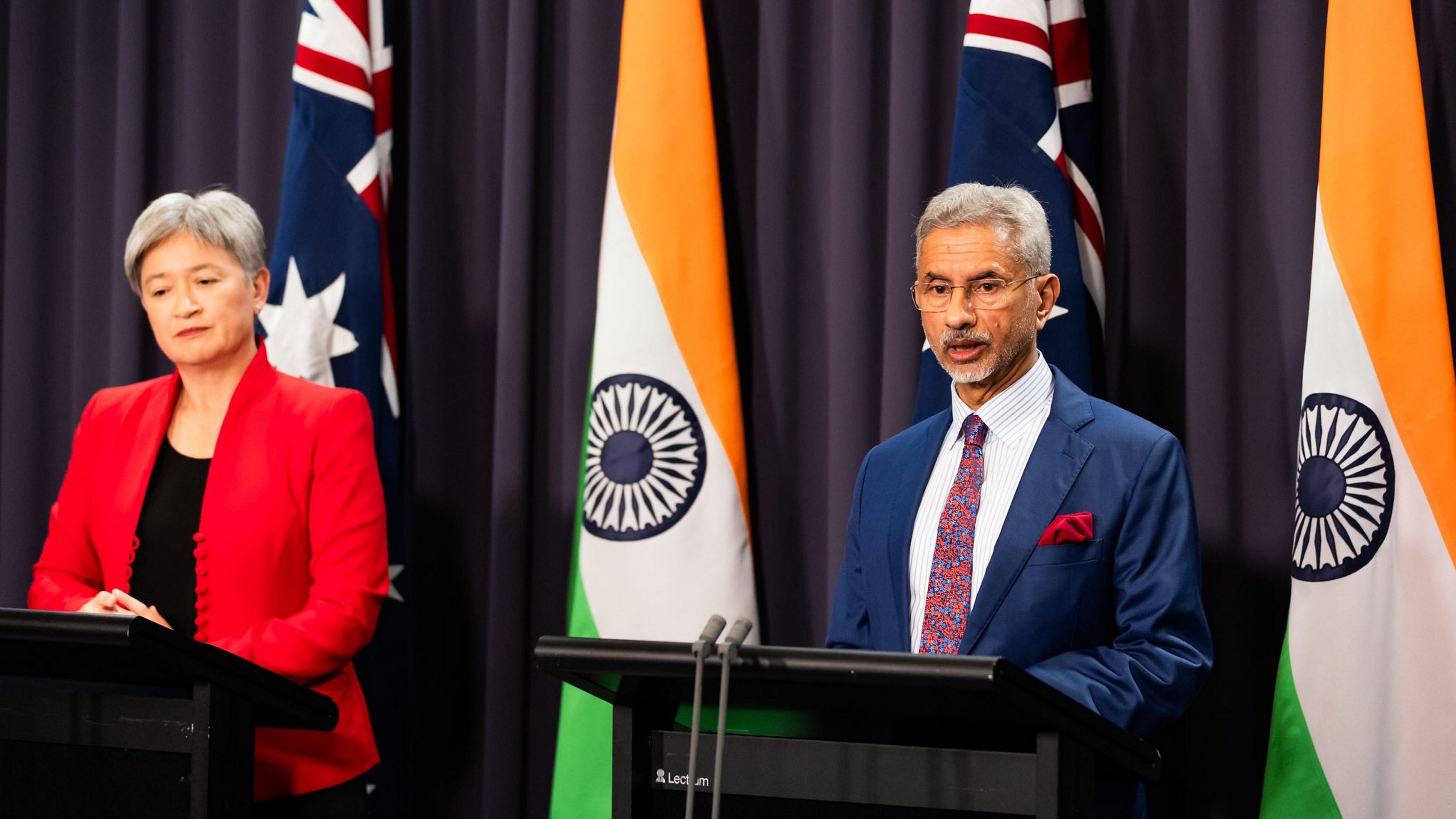
External Affairs Minister S Jaishankar with Australian Foreign Minister Penny Wong during the 15th India - Australia Foreign Ministers Framework Dialogue, in Canberra, Australia.
Credit: PTI Photo
New Delhi: Canberra on Tuesday subtly underlined its differences with New Delhi on Ottawa’s allegations about India’s alleged role in the killing of Khalistani Sikh extremist Hardeep Singh Nijjar in Canada.
New Delhi, however, conveyed to Canberra that Canada’s allegations about the alleged role of the diplomats and other officials of India in illegal activities in the North American country were not supported by any evidence.
As External Affairs Minister S Jaishankar met Australian Foreign Minister Penny Wong in Canberra, Canada’s allegation about the involvement of the agents of the Government of India in “criminal activities” targeting Khalistani Sikh extremists in the North American country came up for discussion.
“We have made clear our concerns about the allegations (against officials of India) under investigation (in Canada). We've said that we respect Canada's judicial process. We convey our views to India as you would expect us to do,” Wong told journalists after she and Jaishankar had a meeting.
She was replying to a question on Australia’s position on Canada’s allegations against India. "And, we have a principled position in relation to matters such as the rule of law and the independence of the judiciary and also frankly the sovereignty of all countries," she said.
The meeting between Jaishankar and Wong took place a day after Prime Minister Narendra Modi led the Government of India to condemn the “deliberate attack” carried out by the Khalistani Sikh extremists on the devotees of the Hindu Sabha Mandir at Brampton in Canada.
The Khalistani Sikh extremists allegedly sought to protest and disrupt a consular camp organised by the High Commission of India in Ottawa in association with the Hindu Sabha Mandir. There were similar protests by the Khalistani Sikh extremists against similar consular camps organised by New Delhi’s missions in Ottawa, Vancouver, and Toronto.
Wong drew a line between the right to peaceful protest and vandalism in response to a question from a journalist on the clashes between the Khalistani Sikh extremists and devotees of the Hindu Sabha Mandir.
“In relation to the vandalism that you describe, I know that our local members have expressed a very strong view about that, particularly in the week of Diwali, it's a very upsetting thing for people of the faith community and the Indian community more broadly,” she said. “So, I would again say people across Australia have a right to be safe and respected. People also have a right to peaceful protest, people have a right to express their views peacefully, we draw a line between that, and violence, incitement of hatred, or vandalism and they should be dealt with by the appropriate law enforcement authorities.”
“The incidents which the gentleman there (a journalist) spoke about, do look at the video, I think they would tell you in a way the political space today which is being given to extremist voices there. So, we believe in freedom, and we also believe freedom should not be abused, and we had a talk about it, exactly on the lines,” Jaishankar said.
Australia, along with New Zealand, the United States, and the United Kingdom, is a partner of Canada in the ‘Five Eyes’ intelligence alliance. The ‘Five Eyes’, according to Prime Minister Justin Trudeau’s government in Ottawa, played a key role in gathering intelligence about the alleged role of India’s agents in the killing of Nijjar in the parking lot of a gurdwara at Surrey in the British Columbia province of Canada on June 18, 2023.
Nijjar, who had once led the Khalistan Tiger Force terrorist organisation, had managed to secure citizenship in Canada despite being one of the most wanted fugitives of India.
“One, Canada has developed a pattern of making allegations without providing specifics. Secondly, when we look at Canada, for us, the fact that they're putting our diplomats under surveillance is something, which is unacceptable,” Jaishankar said in response to another question when he and Wong jointly spoke to journalists.
Australia is also a partner of India in the Quad, a four-nation bloc, which also comprises Japan and the US and primarily seeks to counter China’s expansionist aspirations in the Indo-Pacific, with a series of programmes focussing on welfare and development partnerships with other nations in the region.
New Delhi last month withdrew High Commissioner of India to Canada, Sanjay Kumar Verma, and five of his colleagues after turning down Ottawa’s request for waiving their diplomatic immunity and making them available for questioning by the police investigators in connection with the murder of Nijjar and the targeting of other Canadian Sikhs.
India also retaliated by expelling six diplomats of Canada.
